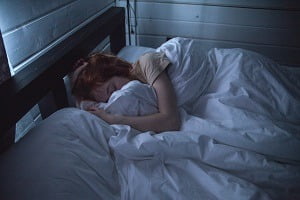How To Cope With Panic Attacks At Night
Many people deal with pain and anxiety, but when these feelings become so overwhelming and intense, it may trigger within them an episode of acute fear known as a “panic attack.” This can cause people to feel as if they have a complete lack of control over their current situation or lives, and bring about near hysteric levels of anxiety and negative emotion. It is even more overwhelming when the subject is vulnerable and when panic attacks occur at night.
Some studies indicate that the body’s natural “fight or flight” mechanism may play a key role in this variety of response, the same process that takes place under very dangerous or even life-threatening situations.
What Triggers Panic Attacks at Night?
Several factors come into play with regard to why panic attacks happen. Some that are most commonly considered include drastic events that have taken place in a person’s personal or professional life, mood swings and changes within brain chemistry due to hormones or medications.
Genetics are also thought to play a role for those with a family history of anxiety, depression, and stress. One in every 13 people worldwide suffers from anxiety and nearly 75% of people with a mental disorder remain untreated,
[1] putting them at a much higher degree of risk for conditions that can include chronic anxiety or panic attack disorders.
What Does a Panic Attack At Night Feel Like?
Night time is one of the most common periods for a person to experience a panic attack. Typically, these events begin with restricted breathing or hypertension that can induce a sense of suffocation.
Also, they may feel as if their limbs stop responding as normal and they may experience strong sensations of feeling extremely hot or cold with sweat or chills permeating throughout the body. Usually, these extreme bouts of anxiety do not last more than 15 minutes, however they can create significant disorientation that may make it seem much longer, even painfully so.
How to Respond to Panic Attacks at Night – in The Moment
Having a plan of action ready when a panic attack strikes is a good way to lessen its severity and make the situation less rattling. It’s important to begin by not struggling against the sensation or resisting it outright, instead trying to ease the symptoms by working through it.
[2]
Following the steps involved in the AWARE sequence is a wise approach for many, including acknowledging and accepting, waiting and watching, taking action to make yourself feel more at ease, and repeating the process as needed. After the attack subsides, be compassionate with yourself and realise that many of the feelings you experienced were a natural and common response.
What to Do the Next Day
After experiencing an initial attack, people may feel nervous or anxious about having another one the very next day. Many people begin worrying about when to go back to sleep again or turn to medication, alcohol, or other activities as a way of coping with their situation.
However, it is better to learn how to live with these feelings and accept them for what they are, being kind and understanding to yourself along the way.

Symptoms of A Panic Attack At Night
There are many symptoms that can stem from experiencing a panic attack, but these can include chest pains or increased heart rate, dizziness, a loss of orientation, a strong sense of unease or impending danger, and more.
These sensations may also make it difficult to concentrate, or focus on relationships and professional matters that have a strong impact in the person’s own life. [3]
Sleep is also a common issue with those facing panic attacks, making it more difficult to fall or stay asleep on a regular basis. Dealing with anxiety can have a significant effect in many areas of a person’s life, which is why it is so important that they know how to deal with their panic attacks and take the right steps to counter them.
How Common Are Panic Attacks at Night?
Facing panic attacks is an occurrence that is more common than many people realise, and may affect up to 40% of the population at some point throughout their lives. [4]
Nearly 5 per cent of Australians will be confronted with panic disorder at some point over a year-long time period and an estimated 2.7% of Americans had panic disorder within the past year, while 4.7% of U.S. adults will experience it during their lifetime.
What Are Night Terrors?
Sleep disorders and panic attacks often go hand-in-hand, and it’s not uncommon for a person struggling with panic disorder to deal with night terrors that fall under a form of sleep disorder known as parasomnia.
Quite like panic attacks at night, night terrors are also periods of intense fear and anxiety felt during the sleeping process, commonly taking place within the earlier part of the night. These events can cause intense sensations that often lead to a full-on panic attack and can exacerbate the symptoms of someone already struggling with a panic disorder.
What Are Catastrophic Misinterpretations?
Many thoughts or conclusions can jump into a person’s head once they start experiencing a panic attack, and some may lead to false conclusions about what is being experienced or can have negative consequences if not realised for what they are.
For example, when someone is experiencing a pounding heart in the course of a panic attack, they may feel as if they are actually having a heart attack or might suffocate while dealing with shortness of breath. This can contribute to the overall fear and intensity of the event, as the individual believes they are experiencing a catastrophic event when in actuality they are going through the symptoms of a panic attack.
How Are Panic Attacks at Night Diagnosed?
Although diagnostic tests like blood tests and physical exams are unable to indicate whether someone is experiencing a panic attack, they can make sure that nothing else is taking place involving symptoms related to thyroid conditions, heart disease, or something else.
This can help to develop the right approach for treating the condition, and put the patient in touch with the proper specialists who can help them deal with the problem. It will also help make the patient aware of any symptoms accompanying their panic attacks, so that they can be prepared to deal with the full range of possible consequences. [5]
Treatments For Panic Attacks At Night
Finding the right treatment approach for dealing with anxiety issues isn’t always an easy process, and several different options and treatment approaches exist due to the wide variety of symptoms and underlying causes the subject may be dealing with.
Psychotherapy techniques including cognitive behavioural therapy (CBT) may be appropriate for some, while still others may turn to prescribed medicines or seek to treat specific associated physical symptoms such as hyperthyroidism, chronic fatigue, or diabetes. [6]
How to Stop Panic Attacks at Night
If you are experiencing a panic attack at night, there are certain steps that can be taken to deal with the situation based upon the recommendation of the NHS. First, it is advisable to close your eyes and breathe inward slowly and deeply through the nose.
Exhale through the mouth slowly and deeply as before, and continue repenting the process counting “one” through “five” upon each inhale and exhale. Try to be as aware of the anxiety taking place within you and best understand the nature of the phenomena. [7]

What if I Can’t Sleep For Fear of a Panic Attack At Night?
Anxiety and worry can feed upon a person’s ability to get a sound and healthy night’s sleep, and because intense panic attacks tend to stir up deep emotions and racing thoughts within the subject, this can become a significant obstacle for them being able to get the peaceful rest they need at night.
It’s important to recognize that worrying over “what if” scenarios does nothing to improve the situation here in the present moment, and so letting go of these thoughts can go a long way toward dispelling the persistent stress and anxiety. Ask the question why it is you are unable to sleep, then work toward addressing the core thoughts and feelings that lie at the centre of the problem.
Healthy Sleep Habits
Keeping healthy is an essential part of winning the battle against panic disorder, as the healthier you are the more ready and prepared you will be to handle any symptoms. Having a healthy sleep schedule in place and doing your best to adhere to it is a good way of helping to promote a balanced and less stressful sleep cycle.
Have a set time for falling asleep and waking up in place, and make every effort to stick to them no matter what by adequately preparing for bed time and setting alarms that will help you wake up at your target hour.
When to See a Doctor For Panic Attacks At Night
Constant anxiety and panic attacks can have a profound negative impact in a person’s life, leading to consequences at work, home, or in social settings. If this leads to chronic insomnia or noticeable health effects, it may be time to seek out the advice and assistance of a trained medical professional.
Finding the right help can do much to address the individual’s unique set of causes and symptoms that have promoted the onset of panic attacks or panic disorder in the first place, and lead to a brighter future at work and at home.
Need more help?
If you’re struggling addiction, recovery or mental health issues, don’t hesitate to call us today on 0800 088 66 86 for free support & guidance.
References
[1] https://adaa.org/about-adaa/press-room/facts-statistics
[2] https://www.ncbi.nlm.nih.gov/pmc/articles/PMC3629320/
[3] https://www.sciencedirect.com/science/article/pii/S0890856709643197
[4] https://www.beyondblue.org.au/the-facts/anxiety/types-of-anxiety/gad
[5] https://www.nimh.nih.gov/health/statistics/panic-disorder.shtml
[6] https://www.aafp.org/afp/2015/0501/p617.html
[7] https://www.cambridge.org/core/journals/the-british-journal-of-psychiatry/article/panic-attacks/60B95CC2AF8DE3F5F4802985BEFEDA1A




